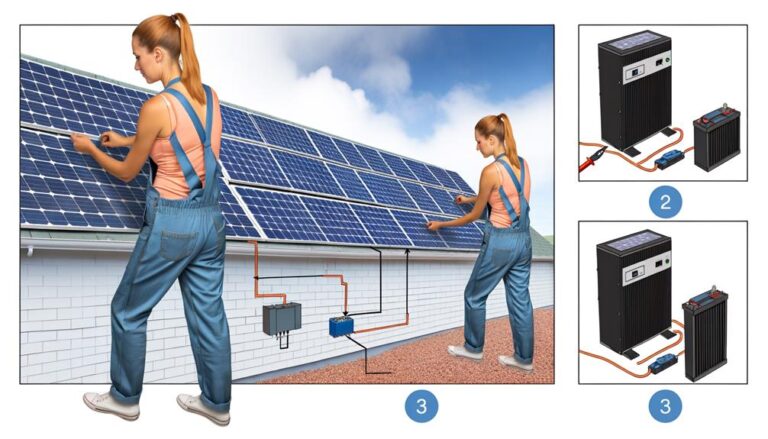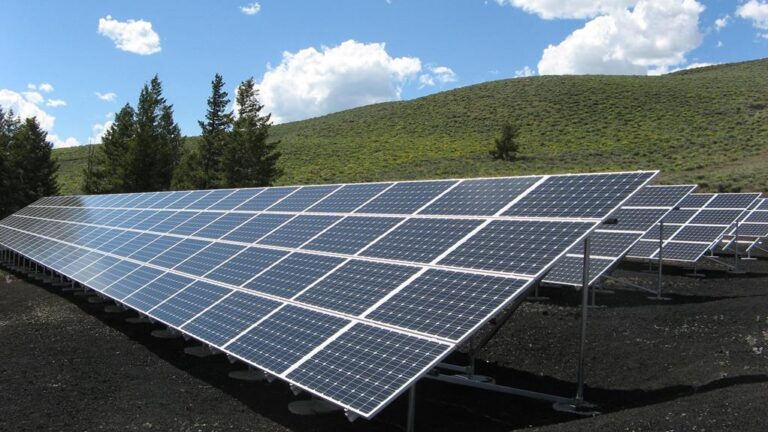9 Key Tips on Off-Grid Solar Energy Policies
Imagine you’re embarking on a journey through a vast forest, seeking to harness the power of the sun to fuel your off-grid solar energy system.
As you navigate through the dense foliage, you come across a signpost with nine key tips on off-grid solar energy policies.
These tips are like compasses, guiding you towards the path of success and efficiency in your solar journey.
From government incentives and tax credits to monitoring and reporting requirements, each tip holds valuable information that can shape your decision-making process and ensure a smooth transition into a sustainable energy future.
So, grab your metaphorical compass and let’s embark on this enlightening journey together.
Key Takeaways
- Government incentives and policies play a crucial role in reducing the costs of off-grid solar energy systems and making them financially viable.
- Net metering policies and regulations allow individuals to sell surplus energy back to the local power network, offsetting electricity bills and promoting energy independence.
- Implementation challenges include technical limitations, balancing energy production and consumption, and staying adaptable to policy changes.
- Compliance with interconnection standards, permitting, zoning, and safety requirements ensures the safe and efficient operation of off-grid solar systems and contributes to the sustainable development of remote communities.
Government Incentives and Tax Credits
Government incentives and tax credits can significantly reduce the costs of off-grid solar energy systems, making them a wise investment for individuals looking to offset the initial high cost of solar technology.
By taking advantage of available government incentives and tax credits, you can’t only make off-grid solar more financially viable but also enjoy long-term financial benefits.
These incentives and credits are designed to encourage the adoption of renewable energy, and they can make a substantial difference in the overall cost of your off-grid solar energy system.
Understanding and utilizing the available government incentives and tax credits is crucial to maximize your savings and ensure a more affordable transition to clean, sustainable energy.
Net Metering Policies
Net Metering Policies offer several benefits to individuals who choose to generate their own electricity. With these policies, you can’t only reduce your reliance on utility companies but also sell any surplus energy back to the local power network.
Additionally, Net Metering Policies allow for the storage of excess energy, ensuring you have a backup during cloudy days or at night.
However, despite these advantages, there may be certain regulations and implementation challenges to consider when adopting Net Metering Policies.
Benefits of Net Metering
Utilizing net metering policies offers a multitude of benefits for those who embrace off-grid solar power systems. By taking advantage of net metering, you can sell any surplus energy back to the local power network, effectively reducing or even eliminating your electricity bills.
Here are four key benefits of net metering for off-grid solar systems:
- Financial savings: Net metering allows you to offset the initial investment of your off-grid solar system through long-term savings on your electricity bills.
- Energy independence: With net metering, you have the freedom to generate your own solar energy and rely less on traditional power sources, giving you greater control over your energy consumption.
- Environmental sustainability: By reducing reliance on traditional power sources, net metering helps contribute to a more sustainable future by promoting the use of clean and renewable solar energy.
- Increased flexibility: Net metering provides flexibility in managing your energy production and consumption, allowing you to make the most efficient use of your off-grid solar system.
Net Metering Regulations
Understanding the regulations surrounding net metering is crucial for maximizing the benefits of off-grid solar energy systems. Net metering regulations allow you to sell surplus solar energy back to the local power network, offsetting your electricity bills through credits for excess energy production.
By complying with these regulations, you ensure fair compensation for the solar energy you export. However, it’s important to note that net metering policies vary by location, so it’s essential to research and understand the specific regulations in your area. This will enable you to navigate the requirements and take full advantage of the benefits offered by net metering.
Implementation Challenges
Navigating the challenges of implementing net metering policies requires careful research and compliance with location-specific regulations. These policies can vary by location, making it crucial to understand the specific requirements and guidelines. Here are four key implementation challenges to consider:
- Technical limitations and restrictions: Adapting to the technical limitations and restrictions outlined in net metering policies may impact system design and energy storage. It’s important to ensure that your solar energy system is compatible with the requirements set by the policies.
- Balancing energy production and consumption: Maximizing the benefits of net metering policies requires balancing energy production and consumption. Understanding the limitations and potential restrictions can help you optimize your energy usage and ensure that you’re making the most of the policy benefits.
- Documentation and reporting requirements: Net metering policies often come with documentation, reporting, and metering requirements. It’s essential to comply with these requirements to ensure eligibility and fair compensation. Keeping track of your energy production and consumption is crucial for meeting these obligations.
- Anticipating policy changes: Net metering policies are subject to change over time. It’s important to stay informed about potential changes in policies and regulations that could impact your long-term financial returns and system scalability. Being prepared and adaptable can help you navigate these changes effectively.
Interconnection Standards and Regulations
Compliance with interconnection standards and regulations ensures the safe and efficient connection of off-grid solar systems to the local power network.
Adhering to these standards is crucial to ensure the reliability and safety of off-grid solar systems. It’s important to understand and follow the specific interconnection requirements in your area as they may vary.
By doing so, you can facilitate the process of selling surplus energy back to the local power network. Understanding and complying with interconnection standards and regulations is essential for the smooth integration of off-grid solar systems with the existing power infrastructure.
These standards and regulations play a vital role in the successful implementation of solar energy solutions in off-grid areas. They help to ensure that the off-grid solar systems are properly connected, operate efficiently, and contribute to the sustainable development of remote communities.
Permitting and Zoning Requirements
Before installing off-grid solar systems, it’s crucial to verify and comply with local permitting and zoning requirements. Here are four key considerations to keep in mind:
- Compliance with building codes and zoning regulations: Ensure that your solar panel placement meets the requirements set by your local authorities. This includes setback requirements, installation height limits, and property line restrictions.
- Obtain necessary permits: Before starting any off-grid solar installations, it’s important to obtain the required permits from local authorities. This ensures that your system is installed in a safe and legal manner.
- Work with experienced installers: Collaborate with installers who are familiar with local permitting and zoning regulations. Their expertise will help you navigate the process effectively and avoid potential complications.
- Stay informed: Keep yourself updated on any changes in local permitting and zoning requirements for solar energy systems. This will ensure that you remain in compliance with the latest regulations and guidelines.
Grid Access and Utility Cooperation
To ensure successful grid integration and collaboration with utilities, it’s crucial to understand the importance of grid access and utility cooperation.
This involves working closely with local utility companies to establish a connection to the grid and abide by legal and regulatory requirements for selling surplus energy back to the grid.
Grid Integration
Securing grid access and cooperating with utility companies are essential steps for successful grid integration of off-grid solar systems. Here are some key considerations to keep in mind:
- Selling surplus energy: Off-grid solar users may have the opportunity to sell excess energy back to the local power network. This not only helps them recoup their investment but also contributes to the overall renewable energy supply.
- Cooperation with utility companies: Collaborating with utility companies is crucial for ensuring a smooth grid integration process. This involves understanding and complying with local regulations and policies, as well as establishing clear communication channels to address any issues that may arise.
- Reliability and backup power: Grid access allows off-grid solar users to benefit from the reliability and backup power of the traditional power grid. This ensures that energy needs are met during periods of low solar generation or high energy demand.
- Planning for future growth: When integrating off-grid solar systems into the grid, it’s important to consider future expansion and scalability. This involves thoughtful planning, proper infrastructure, and coordination with utility companies to accommodate increasing energy demands.
Collaborating With Utilities
When integrating off-grid solar systems into the grid, it’s essential to collaborate with utility companies to secure grid access and ensure successful utility cooperation. Understanding the legal requirements and local regulations for grid access and utility cooperation is crucial.
Collaborating with utilities allows you to explore options for selling surplus energy back to the local power network, maximizing the benefits of your solar energy system. Grid access also brings the advantage of backup power during low solar input periods.
Engaging with utilities is important to discuss net metering policies and incentives for off-grid solar systems. By working together, you can ensure compliance and integration of your off-grid solar system with the existing grid infrastructure.
Collaborating with utilities is a key step towards establishing a sustainable and efficient solar energy system.
Off-Grid Solar System Size Limitations
Sun exposure significantly impacts the size of the solar system required for off-grid energy, allowing for potential cost savings in sun-rich areas and potentially necessitating a larger system in areas with limited sun exposure. Here are four key factors to consider regarding off-grid solar system size limitations:
- Sun-rich areas: In areas with ample sunlight, smaller solar systems can be installed, resulting in cost savings for off-grid users. The high sun exposure ensures efficient energy generation, making smaller systems sufficient to meet energy needs.
- Limited sun exposure: Areas with limited sun exposure may require larger solar systems to compensate for the reduced energy generation. These systems need to be designed to capture as much sunlight as possible to ensure optimal energy production.
- Maximum current capacity: Most modern solar charge controllers don’t exceed 80 Amps. Working with higher currents can be dangerous and may cause problems, so it’s important to adhere to the maximum current capacity when determining the size of an off-grid solar system.
- System efficiency: It’s essential to consider the efficiency of the solar panels and other components when determining the system size. Higher efficiency panels can generate more energy with a smaller footprint, allowing for a more compact off-grid solar system.
Understanding these off-grid solar system size limitations is crucial when developing solar energy policies and designing effective off-grid solar systems.
Battery Storage Policies and Regulations
To ensure compliance with safety and environmental standards, it is important to understand local regulations and standards for battery installation and use in off-grid solar systems.
Battery storage systems play a crucial role in maximizing the benefits of renewable energy sources, such as solar power systems, by storing excess energy for later use. However, regulations and policies surrounding battery storage can vary depending on the location.
It is recommended to check for any incentives, rebates, or tax credits available for off-grid solar battery storage systems. Additionally, be aware of any restrictions or limitations on the size and type of batteries that can be used in off-grid solar setups.
Consulting with a professional can help navigate the legal and regulatory aspects of integrating battery storage into an off-grid solar energy system.
Battery Storage Policies and Regulations
- Understand local regulations and standards for battery installation and use in off-grid solar systems.
- Ensure compliance with safety and environmental standards for battery storage.
- Check for any incentives, rebates, or tax credits available for off-grid solar battery storage systems.
- Be aware of any restrictions or limitations on the size and type of batteries that can be used in off-grid solar setups.
- Consult with a professional to navigate the legal and regulatory aspects of integrating battery storage into an off-grid solar energy system.
Off-Grid Solar System Safety Guidelines
For optimal safety in off-grid solar systems, it’s important to adhere to specific guidelines to ensure the proper installation and maintenance of the system. Here are four safety guidelines to consider:
- Location: Ensure that solar panels are installed in an easily accessible location for regular cleaning and maintenance. This will help prevent any potential hazards and ensure the system’s efficiency.
- Battery quality: Use high-quality batteries that are suited to the local climate. This will optimize the performance and longevity of the off-grid solar system, reducing the risk of malfunctions or accidents.
- Backup power: Consider incorporating backup power systems like auto-start generators. These systems provide uninterrupted power supply during low solar input or unexpected events, ensuring continuous energy availability.
- Inverter selection: Choose the right inverter for your off-grid solar system. Avoid hybrid inverters and opt for reliable and suitable options that will enhance system performance and reliability.
Monitoring and Reporting Requirements
Monitoring and reporting requirements play a crucial role in ensuring the compliance, performance, and effectiveness of off-grid solar systems. Regular monitoring of energy usage and system performance is essential for optimizing off-grid solar systems. By closely monitoring the solar energy generated and consumed, you can identify any inefficiencies or issues that may arise.
Accurate reporting of energy production and usage helps assess the effectiveness of the off-grid solar setup and make necessary adjustments. Monitoring and reporting requirements also provide insights into the long-term performance and efficiency of the off-grid solar system.
Frequently Asked Questions
What Are the Challenges of Off-Grid Solar System?
The challenges of an off-grid solar system include cost considerations, maintenance requirements, and environmental impact. You need to carefully manage expenses, maintain equipment regularly, and be mindful of how your energy choices affect the environment.
What Are the 4 Basic Components of an Off-Grid Solar Power Plant?
The four basic components of an off-grid solar power plant are solar panels, batteries, a charge controller, and an inverter. These work together to capture sunlight, store energy, regulate flow, and convert DC electricity into AC electricity for your appliances.
What Do I Need to Know About Solar Off-Grid?
To know about solar off-grid, you need to understand the benefits, maintenance, and cost involved. Solar energy provides independence and reduces reliance on traditional power grids. Regular cleaning and following local laws are essential for optimal performance.
How Do You Plan an Off-Grid Solar System?
To plan an off-grid solar system, start by considering the planning process, system sizing, and installation considerations. Determine your energy needs, assess sun exposure, and choose the right components. Ensure regular maintenance and accessibility for optimal performance.
Conclusion
Congratulations! You’ve learned the key tips on off-grid solar energy policies.
Now, armed with knowledge about government incentives, net metering, interconnection standards, and more, you can navigate the complex world of off-grid solar with ease.
Just remember, like choosing the right battery for extreme climates, understanding and following these policies will ensure your off-grid solar system shines bright, providing sustainable energy for years to come.
So go forth and harness the power of the sun!






